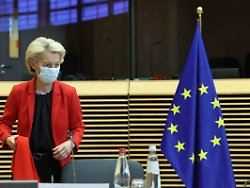Wednesday, December 1st, 2021
Omikron on the rise
Von der Leyen checks vaccination requirements in the EU
A third of EU citizens have not yet been vaccinated against the corona virus: EU Commission President von der Leyen is therefore in favor of checking a general corona vaccination requirement in the European Union. The spread of the new Omikron variant is another reason for this.
EU Commission President Ursula von der Leyen has spoken out in favor of examining a general corona vaccination requirement in the European Union. “We should possibly think about mandatory vaccination in the EU,” said von der Leyen. She justified this with the spread of the new Omikron variant and the fact that a third of EU citizens have not yet been vaccinated against the coronavirus.
The compulsory vaccination is “a discussion that needs to be conducted,” said von der Leyen. A common approach by the member states is required. For Germany, the Federal Chancellor-designate Olaf Scholz announced on Tuesday a legislative procedure for a general vaccination requirement. According to him, it could be initiated this year. Before that, Austria was the first EU country to make vaccination compulsory.
Regarding the Omikron variant, which was first discovered in South Africa, von der Leyen said: “We hope for the best and are preparing for the worst.” In two to three weeks, the scientists would know more about the risks. The possibly necessary adaptation of the vaccines will then “take around a hundred days”. Because of Omikron, Germany and most other EU countries have largely stopped air traffic with South African countries.
Booster progress
The pandemic is also a topic at the first EU summit on December 16 and 17, in which Scholz is likely to take part as Chancellor. It is up to the individual member states to decide whether to introduce compulsory vaccination. However, the EU Commission plays a coordinating role and is responsible for the contracts with the vaccine manufacturers.
Von der Leyen also confirmed information from the acting CDU Federal Health Minister Jens Spahn that the vaccine for children aged five to eleven will be delivered across the EU on December 13th – a week earlier than previously planned. The vaccine manufacturer Biontech also confirmed that the batch of children’s vaccines could be brought forward.
Von der Leyen also welcomed the progress made in so-called boosters in Europe. She stressed that the EU had ordered enough vaccine to give all Europeans a booster by the end of March. The contracts with the manufacturers Biontech / Pfizer and Moderna provide for 360 million cans. In total, the EU had agreed the delivery of 1.8 billion Corona vaccine doses with the pharmaceutical companies in the summer.
The World Health Organization (WHO) is committed to vaccinating as many people as possible worldwide against Covid-19. However, it does not recommend making immunization a legal requirement. “Instead of introducing a mandatory vaccination, the WHO recommendations aim to demonstrate the benefits and safety of vaccination in order to achieve the greatest possible acceptance,” explained WHO spokeswoman Fadela Chaib.
The UN High Commissioner for Human Rights also believes that education and conviction when it comes to Covid vaccination is a better strategy. In particular, marginalized groups and vaccine skeptics should be reached in this way. A vaccination requirement, like all other public health protection measures, must be in accordance with international human rights law, emphasized the spokeswoman for the High Commissioner, Liz Throssell. Specifically, this means: A vaccination must be regulated by law and necessary for public health.
